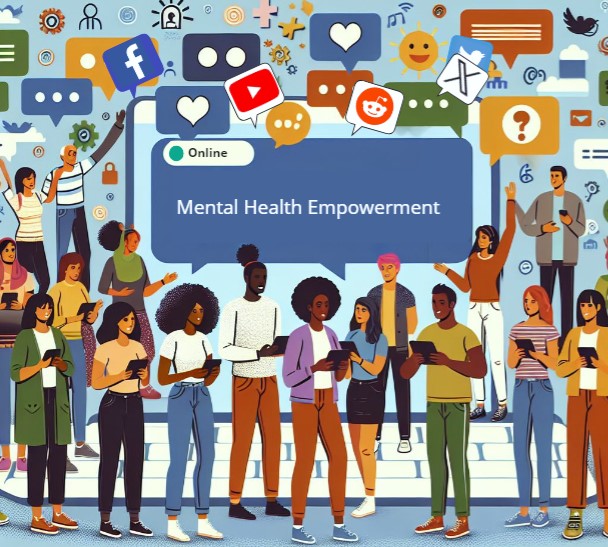Consumer Empowerment in Online Mental Health Communities on Social Media

Consumers from various population levels and groups are empowered by online mental health communities (OMHCs), but how do OMHCs empower them?
Fostering Consumer Empowerment: Social Media and OMHCs
Social media, including online health communities (OHCs), is widely utilized by both people in good health and those suffering from health conditions. Well-known social media platforms, such as Twitter (recently known as “X”), Facebook, YouTube, and Reddit, have emerged as powerful mediums for establishing and engaging in OMHCs. These online communities enable their users to share health-related information, offer advice, exchange personal health experiences, provide emotional support, engage socially, express personal feelings, advocate for mental health awareness, or simply observe such interactions. These activities significantly contribute to the consumer empowerment movement in healthcare, in which people are actively engaged in decisions and actions affecting their health. While OMHCs are acknowledged as consumer empowerment tools, how these online communities empower diverse population levels and groups remains ambiguous.
The Global Movement Towards Consumer Empowerment: Leveraging Social Media and OMHCs
The movement of consumer empowerment has been adopted worldwide by various healthcare stakeholders, including healthcare systems, health authorities, health service institutions, healthcare professionals, researchers, and non-governmental health organizations such as the World Health Organization (WHO). The global adoption of this movement is driven by its significant contribution, which extends beyond improving people’s health outcomes to addressing challenges in healthcare systems, such as rising costs, the burden of chronic diseases, and the shortage of healthcare staff. To guide this movement, the WHO has outlined comprehensive empowerment guidelines within Strategy 1 (empowering and engaging people and communities) of its Integrated People-Centred Health Services (IPCHS) framework, considering diverse population levels (individual level, family level, and community/society level) and groups (informal carers and the underserved and marginalized). Furthermore, the WHO has urged various healthcare stakeholders - related organizations and professionals, including academic and research institutions - to enhance the utilization of social media and digital support groups (e.g., online communities) as digital mental health solutions in healthcare systems. While several healthcare stakeholders, such as mental health organizations and professionals, utilize OMHCs on social media for consumer empowerment purposes, their endeavors to leverage these communities for such purposes could not be fully realized without a nuanced understanding of how OMHCs generate empowerment and engagement values for various population levels and groups in alignment with global empowerment standards (Strategy 1 of the WHO’s IPCHS framework).
The Project’s Objective
In response to the WHO’s call to enhance the use of social media and such online communities in mental healthcare, this research project explores how OMHCs generate consumer empowerment values aligning with Strategy 1 of the WHO’s IPCHS framework. Delving into the dynamics of empowerment within OMHCs with consideration to the diverse population levels and groups in the WHO’s Strategy 1, we aim to develop a nuanced understanding and provide profound insights about how these online communities create consumer empowerment values. Beyond academic significance, these insights hold substantial practical relevance. They can inform various healthcare stakeholders, including governmental and non-governmental health organizations, healthcare professionals, and OMHC founders and moderators, on employing OMHCs with a more effective and targeted approach to foster consumer empowerment in mental health across diverse population levels and groups.
Publications
- AbouWarda, H., & Miscione, G. (2025). Understanding How Discourse Themes in an Online Mental Health Community on Twitter/X Drive Varied Population-Specific Empowerment Processes in Alignment With Global Standards: A Qualitative Analysis of #BipolarClub. Journal of Medical Internet Research, 27, e74912. DOI: https://doi.org/10.2196/74912
- AbouWarda, H., Dolata, M., & Schwabe, G. (2024). How Does an Online Mental Health Community on Twitter Empower Diverse Population Levels and Groups? A Qualitative Analysis of #BipolarClub. Journal of Medical Internet Research, 26, e55965. DOI:https://doi.org/10.2196/55965